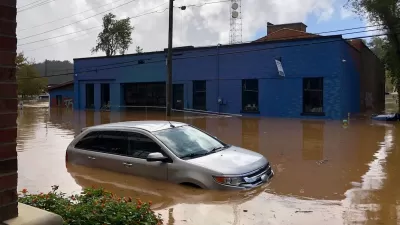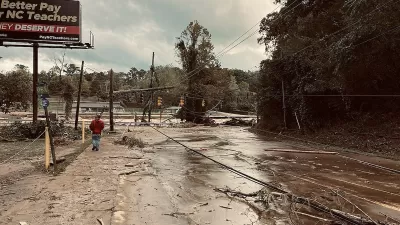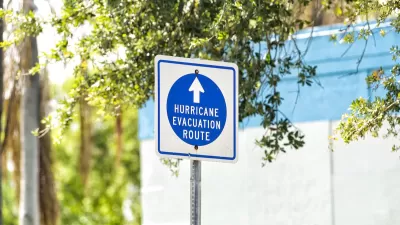The region is becoming more vulnerable to flooding and storm damage due in part to climate change and warmer seas.

The damage caused by last week’s powerful Hurricane Helene in Florida’s ‘Big Bend’ region highlights a growing threat for the area, reports Julia Jacobo for ABC 7.
“The underwater geology of the Gulf of Mexico leaves much of the low-lying coast unguarded against a massive influx of seawater. The continental shelf of the Florida Gulf Coast extends quite far offshore - up to 150 miles in some spots, according to the National Oceanographic and Atmospheric Administration (NOAA) - leaving the shallow waters nowhere to go.” The storm surge from Hurricane Helene is projected to be as high as 20 feet in some parts of the region.
The Big Bend is in increasing danger due to currents from the Gulf of Mexico, a loss of seagrass, and rising sea levels. The U.S. coastline could experience an average rise in sea level of about 11 inches between 2020 and 2025, according to a federal report. “While many factors contribute to the magnitude and impacts of storm surge and coastal flooding, average sea levels for many Gulf Coast communities are more than six inches higher today than they were just a few decades ago, data shows.”
Meanwhile, warmer ocean surface temperatures are fueling stronger hurricanes. “Warmer than normal oceans hold a lot of extra energy that these storms can feed on, and about 80% of major hurricanes, between Categories 3 and 5, undergo rapid intensification, defined as an increase in the maximum sustained winds of a tropical cyclone of about 35 mph or more in a 24-hour period.”
FULL STORY: Hurricane Helene: Climate change is making Florida's Big Bend more vulnerable to tropical threats

Maui's Vacation Rental Debate Turns Ugly
Verbal attacks, misinformation campaigns and fistfights plague a high-stakes debate to convert thousands of vacation rentals into long-term housing.

Planetizen Federal Action Tracker
A weekly monitor of how Trump’s orders and actions are impacting planners and planning in America.

Chicago’s Ghost Rails
Just beneath the surface of the modern city lie the remnants of its expansive early 20th-century streetcar system.

Bend, Oregon Zoning Reforms Prioritize Small-Scale Housing
The city altered its zoning code to allow multi-family housing and eliminated parking mandates citywide.

Amtrak Cutting Jobs, Funding to High-Speed Rail
The agency plans to cut 10 percent of its workforce and has confirmed it will not fund new high-speed rail projects.

LA Denies Basic Services to Unhoused Residents
The city has repeatedly failed to respond to requests for trash pickup at encampment sites, and eliminated a program that provided mobile showers and toilets.
Urban Design for Planners 1: Software Tools
This six-course series explores essential urban design concepts using open source software and equips planners with the tools they need to participate fully in the urban design process.
Planning for Universal Design
Learn the tools for implementing Universal Design in planning regulations.
planning NEXT
Appalachian Highlands Housing Partners
Mpact (founded as Rail~Volution)
City of Camden Redevelopment Agency
City of Astoria
City of Portland
City of Laramie





























